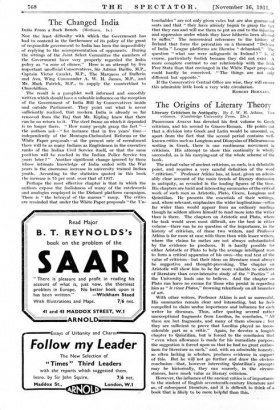The Changed India
India From a Back Bench. (Methuen. Is.)
NOT the least difficulty with which the- Government has had to contend in the furtherance of its policy of the grant of responsible government to India has been the impossibility of replying to the misrepresentation of opponents. During the sittings of the Joint Select Committee the members of the Government have very properly regarded the India policy as "a zone of silence." Here is an attempt by five important unofficial Conservatives, Sir Adrian Baillie, M.P., Captain Victor Cazalet, M.P., The Marquess of Dufferin and Ava, Wing Commander A. W. H. James, M.P., and Mr. Mark Patrick, M.P., to supply the counterblast to Churchillism.
The result is a pamphlet well informed and smoothly written which should have a valuable influence on the reception of the Government of India Bill by Conservatives inside and outside Parliament. They point out what is never sufficiently realized, that modern India is already so far removed from the Raj that Mr. Kipling knew that there can be no return to it. The steel frame on which it depended is no longer there. " How many people grasp the fact "- the authors ask—" for instance that in five years' time— independently of the Montagu-Chelmsford Reforms or the White Paper proposals—at the present rate of recruitment there will be as many Indians as Englishmen in the executive ranks of the Indian Civil Service itself, or that the same position will be reached in the Indian Police Service ten years later ? " Another significant change ignored by those whose intimate knowledge of India ended with the War years is the enormous increase in university trained Indian youth. According to the statistics quoted in this book the increase is 75 percent. over that of 1917.
Perhaps the most effective chapter is that in which the authors expose the foolishness of many of the catchwords and analogies employed in the Diehard platform campaigns. There is " the betrayal of the masses " ramp. The critics are reminded that under the White Paper proposals "the Un-
touchables" are not only given votes but are also guannueea seats and thit " they haVe already begun to grasp the fact that they can and will use them to put an end to the injustice and oppression under which they have hitherto been allowed to suffer." The nonsensical references to the history of Ireland that form the peroration on thousand "Defence of India " League platforms are likewise " debunked." The question " what use were safeguards in Ireland ? " is, of course, particularly foolish' because they did not exist. A more complete contrast to our relationship with the Irish Free State than that envisaged in. the White Paper, proposals could hardly be conceived. -" The things are not only different but opposite."
If the Conservative Central Office are wise, they will ensure this admirable little book a very wide circulation.
ROBERT BERNAYS.






































 Previous page
Previous page